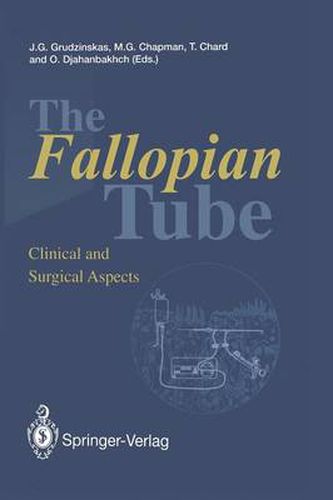Readings Newsletter
Become a Readings Member to make your shopping experience even easier.
Sign in or sign up for free!
You’re not far away from qualifying for FREE standard shipping within Australia
You’ve qualified for FREE standard shipping within Australia
The cart is loading…






This title is printed to order. This book may have been self-published. If so, we cannot guarantee the quality of the content. In the main most books will have gone through the editing process however some may not. We therefore suggest that you be aware of this before ordering this book. If in doubt check either the author or publisher’s details as we are unable to accept any returns unless they are faulty. Please contact us if you have any questions.
The examination of the human fallopian tubes was, until recently, restricted to observations on gross anatomical disposition and tubal patency. These studies, for decades, were the domain of doctors and physiologists whose primary interest was population control and family planning, funded largely by organisations and agencies seek ing alternatives to steroidal contraceptives. For a worrying but short period after the birth of Louise Brown in 1978 as the conse quence of successful in-vitro fertilisation and embryo transfer, the fallopian tube was considered to be dispensable given that the metabolic milieu in which human fertilisation takes place could be effortlessly reproduced in a Petri dish, in in-vitro fertilisation procedures. However, a number of factors have acted together to renew in terest in the fallopian tube, namely new techniques in cell biology, microinstrument developments (in particular in imaging), an inter disciplinary transfer of skills from interventional radiology and car diology to gynaecology, the surgeon’s wish to improve surgical tech niques, and better techniques to monitor early pregnancy. These factors have led surgeons to develop the new diagnostic and ther apeutic strategies and techniques listed here. This volume contains contributions from the majority of keynote speakers at a conference held in London in April 1992 from which its title is derived. Better diagnostic procedures should lead to the implementation of rational effective treatments.
$9.00 standard shipping within Australia
FREE standard shipping within Australia for orders over $100.00
Express & International shipping calculated at checkout
This title is printed to order. This book may have been self-published. If so, we cannot guarantee the quality of the content. In the main most books will have gone through the editing process however some may not. We therefore suggest that you be aware of this before ordering this book. If in doubt check either the author or publisher’s details as we are unable to accept any returns unless they are faulty. Please contact us if you have any questions.
The examination of the human fallopian tubes was, until recently, restricted to observations on gross anatomical disposition and tubal patency. These studies, for decades, were the domain of doctors and physiologists whose primary interest was population control and family planning, funded largely by organisations and agencies seek ing alternatives to steroidal contraceptives. For a worrying but short period after the birth of Louise Brown in 1978 as the conse quence of successful in-vitro fertilisation and embryo transfer, the fallopian tube was considered to be dispensable given that the metabolic milieu in which human fertilisation takes place could be effortlessly reproduced in a Petri dish, in in-vitro fertilisation procedures. However, a number of factors have acted together to renew in terest in the fallopian tube, namely new techniques in cell biology, microinstrument developments (in particular in imaging), an inter disciplinary transfer of skills from interventional radiology and car diology to gynaecology, the surgeon’s wish to improve surgical tech niques, and better techniques to monitor early pregnancy. These factors have led surgeons to develop the new diagnostic and ther apeutic strategies and techniques listed here. This volume contains contributions from the majority of keynote speakers at a conference held in London in April 1992 from which its title is derived. Better diagnostic procedures should lead to the implementation of rational effective treatments.